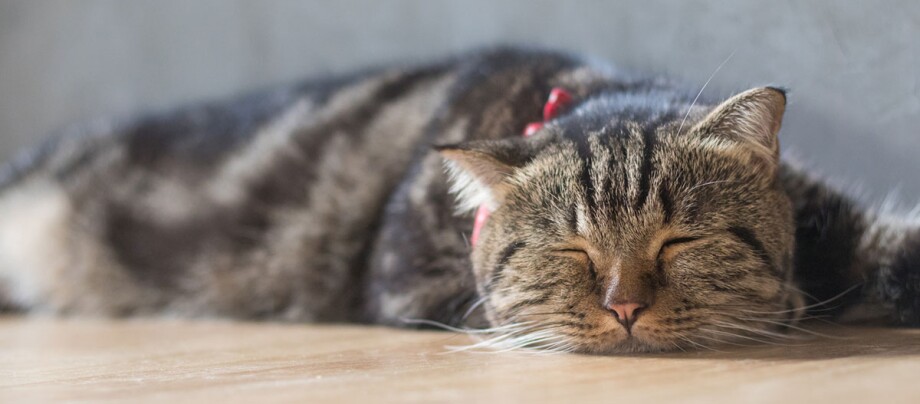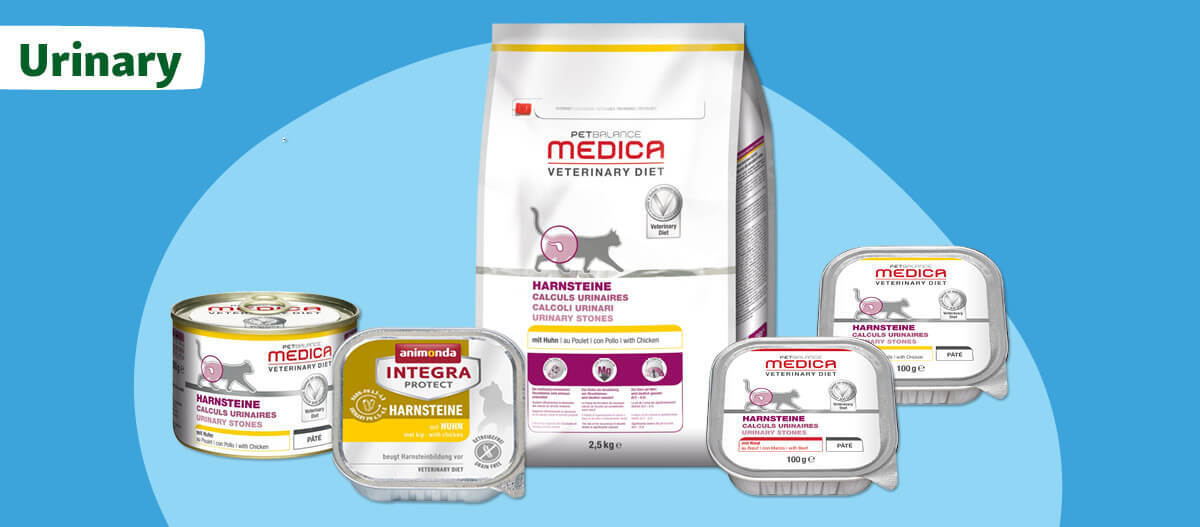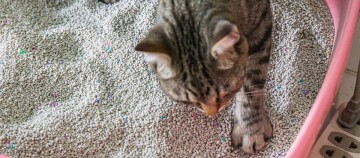Measures That Strengthen Your Pet’s Health and Reduce Cat Cystitis
17.10.2022 - Reading time: 5 minutes

Is your cat always trying to urinate but nothing happens? Often a bladder infection or a bladder stone is the reason behind these signs of illness. A visit to the vet is in now order and they can generally help your cat quickly get rid of this unpleasant illness. Left untreated, an infection and/or obstruction of the urethra can be fatal for your animal.
How do cats get bladder infections?
The causes for a bladder infection, also known as cystitis, are different in cats and humans. If you feel the familiar burning sensation when you go to the toilet, bacteria that have entered the urethra and bladder usually play an important role.
In cats, bacteria are less often the catalyst. Cats frequently get a urinary tract infection when salts dissolved in the urine form crystals and clump up into fine granules or larger stones. Urine grit and stones damage the mucous in the bladder with their sharp edges, and infections can develop and bacteria can infiltrate.
Crystals in urine tend to form when a cat:
- does not drink enough
- has a diet very rich in minerals
- does not get enough exercise
- is permanently stressed
- has a metabolic disease such as diabetes mellitus
Advanced age and obesity can also increase the risk of cystitis caused by renal gravel.
Causes of non-infectious cystitis:
- malformations of the urinary tract
- tumour in the bladder or urethra
- bladder stones
- urinary calculi, i.e. crystalline deposits found in the urinary tract
Non-infectious bladder inflammation in cats occur more rarely. This generally occurs due to bladder stones that irritate the mucous membrane of the bladder and result in an infection. When the immune system of dogs is weakened because of another underlying illness like diabetes, there is the possibility that naturally occurring bacteria are increasing in the urinary tract and cause cystitis. Typical symptoms of cystitis are increased urination, an unpleasant odour to the urine, or even blood in the urine.
Bladder infection in your cat: you can observe these symptoms
You can identify urinary tract infections in domestic cats by the fact that your cat:
- visits the litter tray more often than usual
- only passes small and tiny amounts of urine, despite straining hard
- meows or doubles over when urinating because it is in pain
- suddenly has ‘accidents’ and leaks urine
- frequently cleans its genital area
If you take a closer look at your house cat’s urine, you may notice a reddish or brownish discolouration and/or a stronger odour than usual. If you are generally in doubt as to whether it’s a bladder infection, the best option is to take your pet to the vet.
What can you do if your cat has a bladder infection?
If you take a closer look at your house cat’s urine, you may notice a reddish or brownish discolouration and/or a stronger odour than usual.
The vet will first give your cat a thorough examination and then he will check the urine. He may then prescribe further measures to check the functioning of the urinary tract and kidneys and to rule out abnormalities in these organs. Cats naturally have a narrow urethra. Using imaging techniques such as ultrasound or X-rays, the vet can determine if your cat’s urethra has been obstructed by a crystal or stone.
If a diagnosis of acute cystitis is confirmed, your poor little four-legged friend will be prescribed a variety of medicines. In most cases, this will include:
- antibiotics to fight the inflammation
- painkillers to improve general well-being and to reduce swelling of the inflamed tissues
- antispasmodic medication to counteract the increased urge to urinate
This treatment will generally improve the symptoms within a few days. You can assist the healing process by providing your cat with a warm, quiet place to sleep.
Giving your kitty plenty to drink will also help flush the pathogens and urine deposits out of its bladder. We recommend adding a little chicken broth or lactose-free cat milk to the drinking water to encourage it to drink more.
Moreover, make sure that the litter tray is as dry and clean as possible by cleaning it several times a day. This will help prevent any bacteria excreted from multiplying.
In addition, you can feed a special diet to assist in the treatment of urinary stone disorders:

Please note: A dog can only be fed special veterinary diet food after consulting a vet.
How to prevent urinary tract infections
Acute cystitis can never be completely prevented in cats. But with a few measures you can strengthen your pet’s health and reduce the formation of urinary crystals:
Prevention:
- Clean the litter tray on a daily basis to ensure your cat has a hygienic environment when urinating.
- Keep an eye on your four-legged friend’s weight.
- Play with your cat on a daily basis to ensure it gets regular exercise. In addition, provide toys to keep it occupied, such as soft toy mice or small softballs.
- Place several bowls of fresh water around the house to encourage it to drink. Ideally, you should also set up a drinking fountain.
In the case of urinary gravel and urinary stones, the vet can also prescribe a special diet for your pet with a reduced mineral and protein content.
Chronic cystitis cats
If your cat regularly suffers from bladder problems and the vet is unable to identify a cause, experts refer to this as idiopathic cystitis, i.e. an infection without a clear cause. This chronic form is a huge burden for humans and animals, as it brings with it the same symptoms as the acute illness. It is interesting to note that it is mainly indoor cats in multi-cat households that suffer from this recurring disease.
Experts now suspect that stress is the main trigger for these chronic infections. Given that cats are generally very sensitive to changes and unpleasant situations, it may help your cat if you create a stress-free environment at home. This can be achieved by providing sufficient food, sleeping areas and scratching trees for each cat. It is particularly important to ensure there are enough litter trays – the rule of thumb is one per cat plus one extra. Please be sure to include enough retreats and escape routes so that your cat can avoid tensions with other cats.



